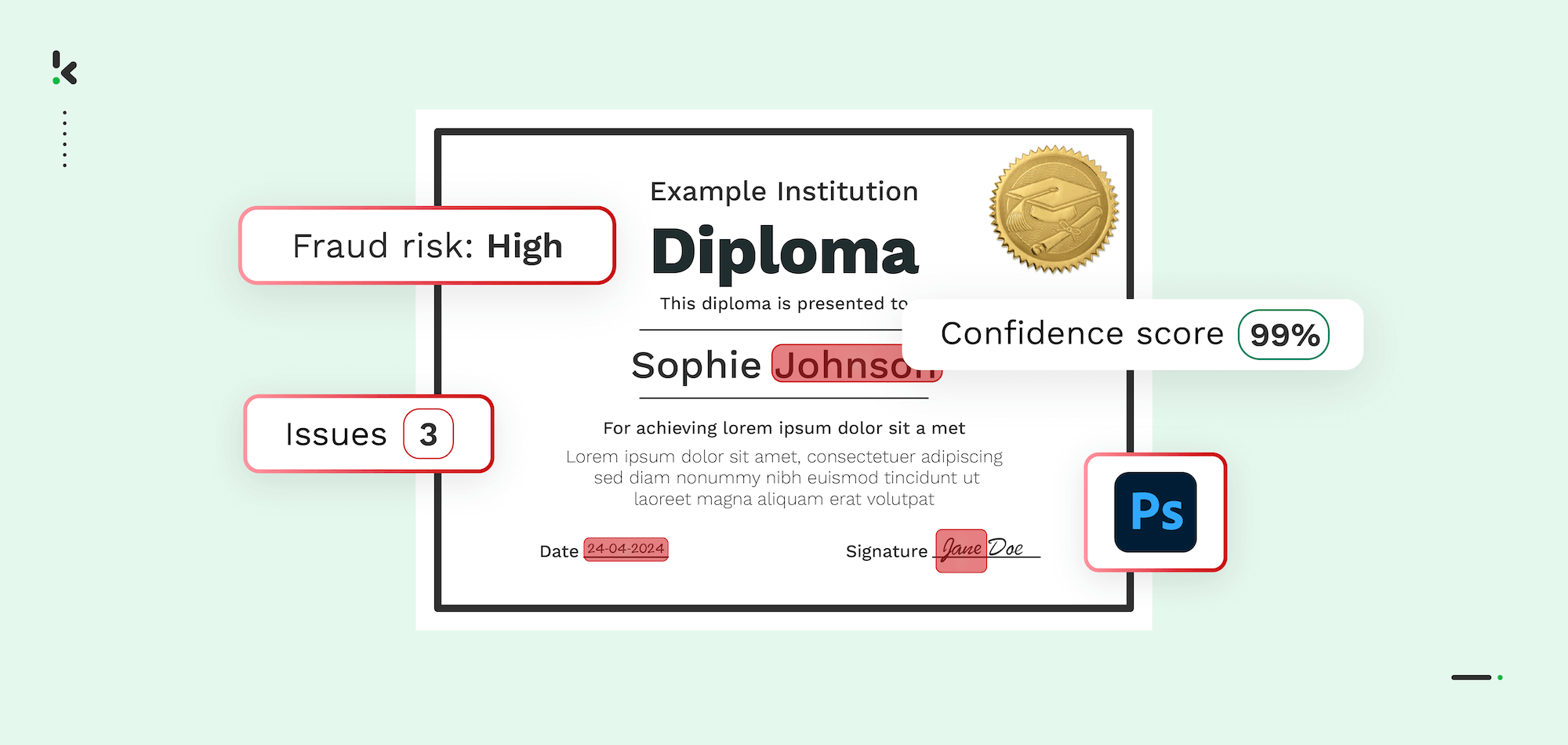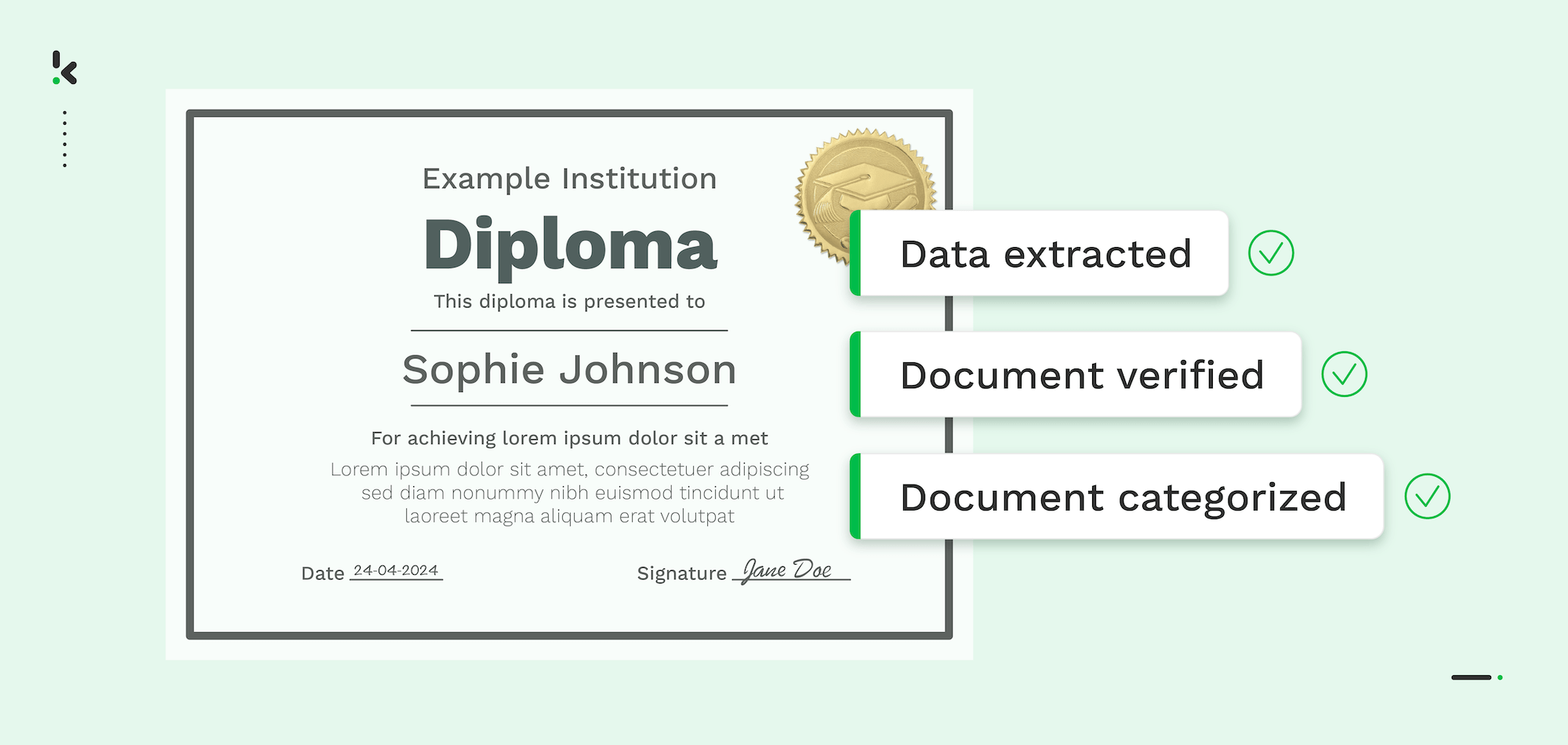

Diploma fraud is on the rise. Fake degrees and forged transcripts from diploma mills are making their way into universities, workplaces, and government agencies across the globe. In fact, experts estimate that up to 4.7 billion people globally have acquired or been affected by fake diplomas, with the industry now valued at over USD 21 billion.
These documents are often indistinguishable from legitimate ones, making manual verification nearly impossible. Even seasoned professionals can struggle to spot forged certificates or falsified CV entries.
One recent case in the United States exposed over 7,600 fake nursing degrees sold through Florida-based schools, allowing unqualified individuals to sit national licensing exams, putting lives at risk and trust in public health systems on the line.
As diploma mills grow more sophisticated, the burden is on organizations to verify credentials thoroughly. This article explores how automated document fraud detection software can help employers, universities, and certification bodies detect fake degrees from diploma mills efficiently and at scale.
Key Takeaways
- The global diploma fraud industry is estimated to be worth USD 21 billion
- Fake degrees are used in job applications, university admissions, and visa processes
- Forged credentials are often indistinguishable from real ones without digital analysis
- High-risk sectors include healthcare, government, education, and corporate HR
- Automated fraud detection software like Klippa improves speed, accuracy, and compliance in verifying diplomas
What Are Diploma Mills and Why Are They a Problem?
A diploma mill is an organization that issues fake academic credentials, often with no coursework required. These diplomas can look strikingly real, complete with logos, signatures, seals, and even fake accreditation.
The impact of diploma fraud is far-reaching:
- Employers risk hiring unqualified staff
- Universities admit students with falsified academic histories
- Governments face challenges in immigration, licensing, and vetting
- Recruitment agencies may place candidates based on forged qualifications
Whether it’s for career advancement, immigration purposes, or academic entry, the demand for fake diplomas is rising, and so is the need for diploma fraud detection.
Who Needs Diploma Verification Software?
Fake diplomas don’t just hurt honest job seekers or students; they impact entire organizations. The consequences range from reputational damage to legal liabilities.
Any organization that relies on the authenticity of diplomas or transcripts can benefit from diploma verification software:
- Higher education: verifying previous education for admissions or credit transfers
- Healthcare: where qualifications directly affect patient safety
- Corporate HR: especially in regulated sectors like finance or law
- Government bodies: vetting applicants for visas, licenses, or civil service
- Screening & background check firms: ensuring candidate integrity at scale
Understanding who is affected is only half the battle. Next, let’s explore how fake diplomas are actually created.


How Fake Diplomas Are Made
Fraudulent diplomas come in many forms, from digitally altered documents to degrees bought outright from unaccredited institutions. With increasingly advanced tools, forgeries are becoming harder to detect by eye alone.
The most common forms of diploma fraud:
- Bought from diploma mills: often presented as life experience degrees or unaccredited certifications
- Digitally manipulated: using design software to alter real documents
- Created from scratch: mimicking legitimate templates from real universities
- Edited PDF files: with altered metadata, dates, or fonts that bypass casual checks
These documents may look authentic on the surface, but often contain hidden signs of tampering if you know where to look.
The Risks of Not Detecting Diploma Fraud
Failing to detect fraudulent credentials can have serious consequences. From reputational damage to legal liabilities and safety concerns, especially in regulated industries, overlooking a fake degree can cost far more than just a bad hire:
- Hire underqualified employees who jeopardize performance and safety
- Violate regulatory standards, especially in healthcare and finance
- Suffer reputational damage if fraud is uncovered publicly
- Lose trust from customers, students, or government partners
- Incur financial losses due to internal fraud or misallocated positions
As diploma mills become more sophisticated, so must the tools used to stop them. Traditional checks fall short, but with Klippa’s intelligent document processing and fraud detection, you can stay ahead. Let’s explore how Klippa makes it possible.
How Klippa Detects and Prevents Diploma Fraud
Klippa’s document verification software combines Intelligent Document Processing (IDP) with advanced fraud detection capabilities. This enables you to identify fake diplomas faster, more accurately, and at scale.
- OCR & Data Extraction
We automatically scan and extract key data fields, such as name, issuing institution, date of graduation, degree title, and more. - Forgery & Layout Checks
Our software analyzes the visual and structural integrity of the document:
– Font inconsistencies
– Logo manipulation
– Watermarks, stamps, and seal accuracy
– Image editing detection (e.g., pixel irregularities) - Metadata Analysis
For digital diplomas, we check:
– File creation timestamps
– Editing history
– Suspicious metadata that may indicate tampering - Cross-Validation (optional)
Compare extracted data against known templates or databases of accredited institutions. Optionally integrate third-party databases for real-time checks. - Audit Trail & Reporting
Every check is logged and made available in a clear, auditable report for compliance purposes.
Klippa’s approach to diploma fraud detection combines advanced technology with practical flexibility, but how does this translate into real value for your organization?


Benefits of Using Klippa for Diploma Verification
Klippa’s solution delivers tangible benefits across sectors by streamlining onboarding, improving accuracy, and ensuring compliance. Here’s what your team can expect when diploma verification is automated and future-proof:
- Faster verification: Automate reviews and reduce manual workload
- Higher accuracy: Spot inconsistencies that humans might miss
- Compliance ready: Maintain audit logs for legal or regulatory reviews
- Cost savings: Scale your verification process without hiring more staff
- Continuous learning: Our AI improves with every document processed
These benefits aren’t just theoretical. They’re already making a difference for organizations across industries.
Real-World Use Cases
Across sectors, from education to healthcare, companies are turning to Klippa to tackle diploma fraud with speed and accuracy.
Healthcare Providers: Verifying Nursing and Medical Degrees
Healthcare institutions face immense risk when staff credentials are not properly vetted. In roles where lives are on the line, such as nursing, radiology, or surgery, verifying academic degrees is non-negotiable. Manual checks, however, are time-consuming and prone to error, especially when foreign credentials or forged diplomas are involved.
Automated diploma fraud detection software can help healthcare organizations streamline credential checks, reduce onboarding times, and ensure that every hire holds a verified and legitimate qualification. This safeguards patients, meets regulatory requirements, and protects the institution from liability.
Universities and Admissions Teams: Screening International Applications
With a growing number of international student applications, universities must assess the authenticity of diplomas and transcripts submitted from around the world. The challenge lies in the diversity of formats, languages, and education systems, along with the increasing quality of forgeries.
By integrating a digital verification solution, admissions teams can automatically extract and analyze document content, compare it against known templates, and flag suspicious submissions. This improves the integrity of the admissions process, protects the institution’s reputation, and helps ensure that only qualified students are admitted.
Government Agencies: Preventing Credential Fraud in Public Sector Hiring
Government bodies, especially in civil service, immigration, and licensing, often handle large volumes of documents when evaluating candidates or applicants. Fraudulent degrees used to secure public-sector roles or official permits can lead to corruption, inefficiency, and a loss of public trust.
With diploma fraud detection software, agencies can automate the screening of academic credentials, ensuring applicants meet required qualifications. This reduces administrative workload, increases transparency, and helps governments uphold the integrity of their hiring and vetting processes.
Background Screening & Recruitment Firms: Ensuring Candidate Integrity
Recruiters and screening providers are responsible for validating the credentials of the candidates they put forward. A single fraudulent hire can damage a client relationship or result in legal consequences. Yet, manually verifying degrees can delay placements and create bottlenecks.
A scalable, automated verification process allows these firms to process high volumes of documents quickly and accurately. It strengthens the trust between the firm and its clients, reduces time-to-hire, and ensures that only properly qualified candidates make it through the pipeline.
We hope these examples have given you a clear idea of how fraud detection software can play a crucial role in identifying and preventing diploma fraud across different industries and use cases.
Final Thoughts: Don’t Let Fake Degrees Slip Through
Detecting diploma fraud is essential not only for protecting your organization but also for safeguarding the people you serve, the integrity of your processes, and the trust you build. Verifying the authenticity of academic documents is a critical step in hiring, admissions, and professional certification.
Klippa’s AI-powered diploma verification software enables organizations to detect fake degrees efficiently, with speed, accuracy, and security at scale.
Book a demo via the form below or contact us to see how Klippa can help you prevent credential fraud.
FAQ
A diploma mill is an organization that offers academic degrees with little to no academic requirements. These degrees are often not recognized by accrediting bodies and are sold for a fee.
How can I tell if a diploma is fake?
Fake diplomas may have visual clues (e.g. inconsistent fonts, incorrect logos), metadata inconsistencies, or formatting that doesn’t match official templates. However, many are too sophisticated for manual detection. That’s where automated software like Klippa helps.
Which sectors are most affected by diploma fraud?
Healthcare, education, government, and corporate HR are especially at risk, as they rely heavily on verified academic qualifications.
Can Klippa verify international diplomas?
Yes. Klippa supports multilingual document analysis and can process and verify credentials from institutions worldwide.
Is Klippa’s diploma verification software GDPR-compliant?
Yes. Klippa is fully GDPR-compliant and also meets international standards like ISO 27001, SOC 2, HIPAA, and CCPA.